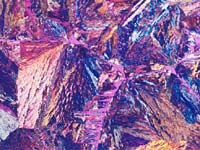Materials Sc / Chemical Eng - 3137
Program Summary
Faculty: Faculty of Science
Contact: http://www.materials.unsw.edu.au
Campus: Kensington Campus
Career: Undergraduate
Typical Duration: 5 Years
Typical UOC Per Semester: 24
Min UOC Per Semester: 6
Max UOC Per Semester: 24
Min UOC For Award: 240
UAC Code: 429012
International Entry Requirements: See International Entry Requirements
Award(s):
Bachelor of Engineering (Major)
Information valid for students commencing 2013.
Students who commenced prior to 2013 should go to the Handbook's Previous Editions
Program Description
The BE BE dual degree program is based upon the existing single BE programs of Materials Science and Engineering (3135) and Chemical Engineering (3040) and is 240 UOC (5 years fulltime) facilitated by common first and second years, common Honours thesis project in year 5, reduction of 18 UOC in non-core content, and reduction of 6 UOC in the General Education requirement.
Students are required to demonstrate a high level of academic ability in their first three years and are expected to perform at a credit level average (WAM >65%) or better to continue progress in both degrees. Student performance is reviewed at the conclusion of Year 2. Students who, at the end of Year 3, do not satisfy this requirement will permitted to complete only one of the BE degrees (this will require internal transfer to the single BE program). The BE BE program structure is specifically designed to facilitate this in that the courses done in Year 2 are acceptable to both single BEs (but need a Program Variation approval) and Year 3 is comprised of Year 3 of one of the single degrees.
All students are required to have gained at least 12 weeks of approved industrial experience before graduation and to have submitted satisfactory reports on such work. Industrial experience is usually obtained during a long vacation at the end of years 2/3/4.
The Institution of Engineers, Australia recognises the Bachelor of Engineering in both Materials Science and Engineering and Chemical Engineering as meeting the examination requirements for admission to graduate and corporate membership. In addition, the Bachelor of Chemical Engineering is accredited by the Institute of Chemical Engineering.
Program Outline
Program is 48 UOC per year. Stages 1 and 2 are common to both BE degrees. Stages 3 and 4 as written below are specific to Materials Science and Engineering and Chemical Engineering, respectively. However, Stages 3 and 4 can be done in reverse order depending on students' preferences. Also, courses in Stages 3 and 4 can also be done concurrently subject to course prerequisite requirements and timetabling. The following four academic streams are available in the BE in Materials Science and Engineering: Ceramic Engineering, Physical Metallurgy, Process Metallurgy, and Materials Engineering. These academic streams are defined by the MATS
professional electives in the particular area of specialisation.
Program Objectives and Graduate Attributes
Program Structure
- MATH1131 Math 1A (6UOC) or MATH1141 Higher Math 1A (6UOC)
- MATH1231 Math 1B (6UOC) or MATH1241 Higher Math 1B (6UOC)
- CEIC1001 Engineering Chemistry (6 UOC)
- ENGG1000 Engineering Design (6 UOC)
- ENGG1811 Computing for Engineers (6 UOC)
- MATS1101 Engineering Materials and Chem (6 UOC)
- PHYS1121 Physics 1A (6 UOC)
Year 1 elective 6 (UoC), recommended:
- MMAN1300 Engineering Mechanics (6 UOC)
Stage 2
- CEIC2000 Material and Energy Systems (6 UOC)
- CEIC2001 Fluid and Particle Mechanics (6 UOC)
- CEIC2002 Heat and Mass Transfer (6 UOC)
- MATH2019 Engineering Mathematics 2E (6 UOC)
- MATH2089 Numerical Methods & Statistics (6 UOC)
- MATS2001 Physical Prop of Materials (6 UOC)
- MATS2004 Mechanical Behaviour of Mats (6 UOC)
- MATS2006 Diffusion and Kinetics (6 UOC)
- MATS Professional Elective 6 (UOC)
- General Education 6 (UOC)
- MATS Professional Elective 6 (UOC)
- MATS5001 Thesis A (6UOC) or CIEC4002 Thesis A (6UOC)
- MATS5002 Thesis B (6UOC) or CIEC4003 Thesis B (6UOC)
- MATS5003 Advanced Thesis B (6UOC) or CIECXXXX (6 UOC)
- MATS Professional Electives totalling 12 (UOC)
The Process Metallurgy stream is designed to produce graduates with training appropriate to the primary metallurgy industry. The profession is very broad and affords opportunities for involvement in many specialist activities in production, technical control or development, in metal or mineral producing industries.
Physical Metallurgy Stream
The Physical Metallurgy stream is designed to produce graduates with training appropriate to both the metal and product manufacturing industries. The profession is very broad and includes careers in metal manufacturing companies, product manufacturing companies (eg, whitegoods, automotive, aircraft)
utilities, airline overhaul and maintenance operations, consulting companies, and research organisations. Graduates may be employed in production, technical control and development, quality assurance, technical
marketing and management. Physical Metallurgy is introduced comprehensively in Stages 3 and 4 by a number of professional electives. Students also undertake a materials design project and a substantial thesis project. Students may complete the first one or two years of their degree at their local university engineering school and then transfer with advanced standing to UNSW.
Ceramic Engineering Stream
The University of New South Wales offers the only degree specialisation in Ceramic Engineering in Australia. The Ceramic Engineering stream is designed to produce graduates with expertise appropriate to the
ceramic manufacturing industries which engineering ceramics, electrical ceramics, whitewares, glass manufacturing, and refractories. Graduates are employed in a
diverse range of areas including production, research and technical development, quality assurance, technical marketing, consulting, and management.
The Materials Engineering stream provides a versatile, comprehensive coverage of areas involving: the
conception and application of properties of materials for use in engineering , structural and specialty needs
necessary in the design and development of specific components; supervision of manufacturing; evaluation
and certification of specifications and characteristics; productio
Academic Rules
Fees
Area(s) of Specialisation









